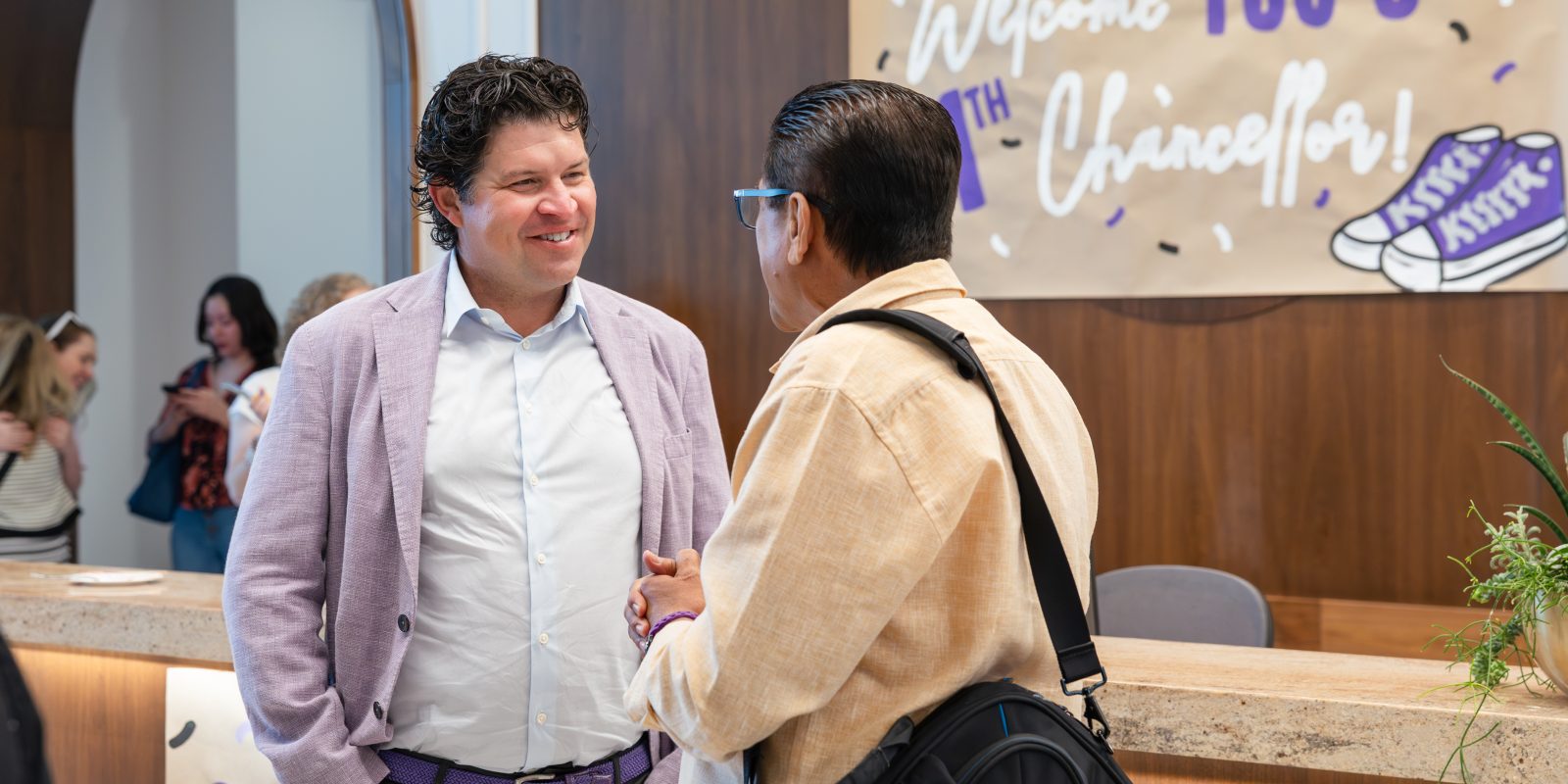
Chancellor Daniel Pullin’s leadership signals a new chapter for TCU — one marked by student success and global aspiration. Photo by Amy Peterson
Defining the Moment
As TCU’s 11th chancellor, Daniel W. Pullin is charting an ambitious future for the university.
Daniel Pullin is known across the TCU campus for inspiring the community to “dream big, be bold and Lead On” — a catchphrase that offers insight into the motivational force behind TCU’s 11th chancellor.
On June 1, Pullin officially took the reins from two-decade leader Victor J. Boschini, Jr., inheriting not just a title, but a trajectory.
Pullin’s pursuit of bolder ideas, a brand built for the future, a bigger student body and an expanded campus footprint is now woven into the fabric of the university’s strategic plan.
“The time to create change is when you have the opportunity to try something new, because you’re at a point of great success,” said Kathy Cavins-Tull, vice chancellor for student affairs.
TCU isn’t just growing; it’s magnifying its belief that it belongs in the upper echelon of U.S. universities. But, as Pullin, who spent the past two years as TCU’s president, said: “We’ve never lost sight of our focus. Regardless of what changes in the world, we will always operate at the individual student level. We will listen, and we will be on the critical path between where our students are today and their aspirations for tomorrow.”
From Classroom Spark to Campus Catalyst
Pullin’s enthusiasm for his new role is anchored in the promise of education. When he arrived at TCU in 2019 as the John V. Roach Dean of the Neeley School of Business, he made a beeline for the classroom, teaching an undergraduate entrepreneurship course.
In class, Pullin and his students envisioned a future that didn’t yet exist but absolutely could and should. That blend of practical idealism and rapid manifestation of ideas cemented his bond with the Horned Frog culture.
“Witnessing the nearly insatiable appetite of external industry partners and other collaborators to invest in our students and our progress and the broader impact we can make as an institution,” he said, “was a really great starting point for me to meet the organization where it was.”
Where is TCU now? In its 152nd year, it’s bigger in size, accomplishment and ambition than ever before while simultaneously doubling down on efforts to build on recent advances.
And its new leader? You’ll often find him striding across campus in purple Converse shoes. The sneakers are a deliberate tool, helping him connect with students while enabling him to “run at the speed of business.”
Pullin represents a new archetype of TCU leader. The university’s first eight chancellors were Disciples of Christ ministers; his immediate predecessor is a renowned scholar of the educational practice. Pullin blends nearly 20 years in higher education with a stint with the world’s preeminent consulting firm, a Harvard MBA and a law degree.
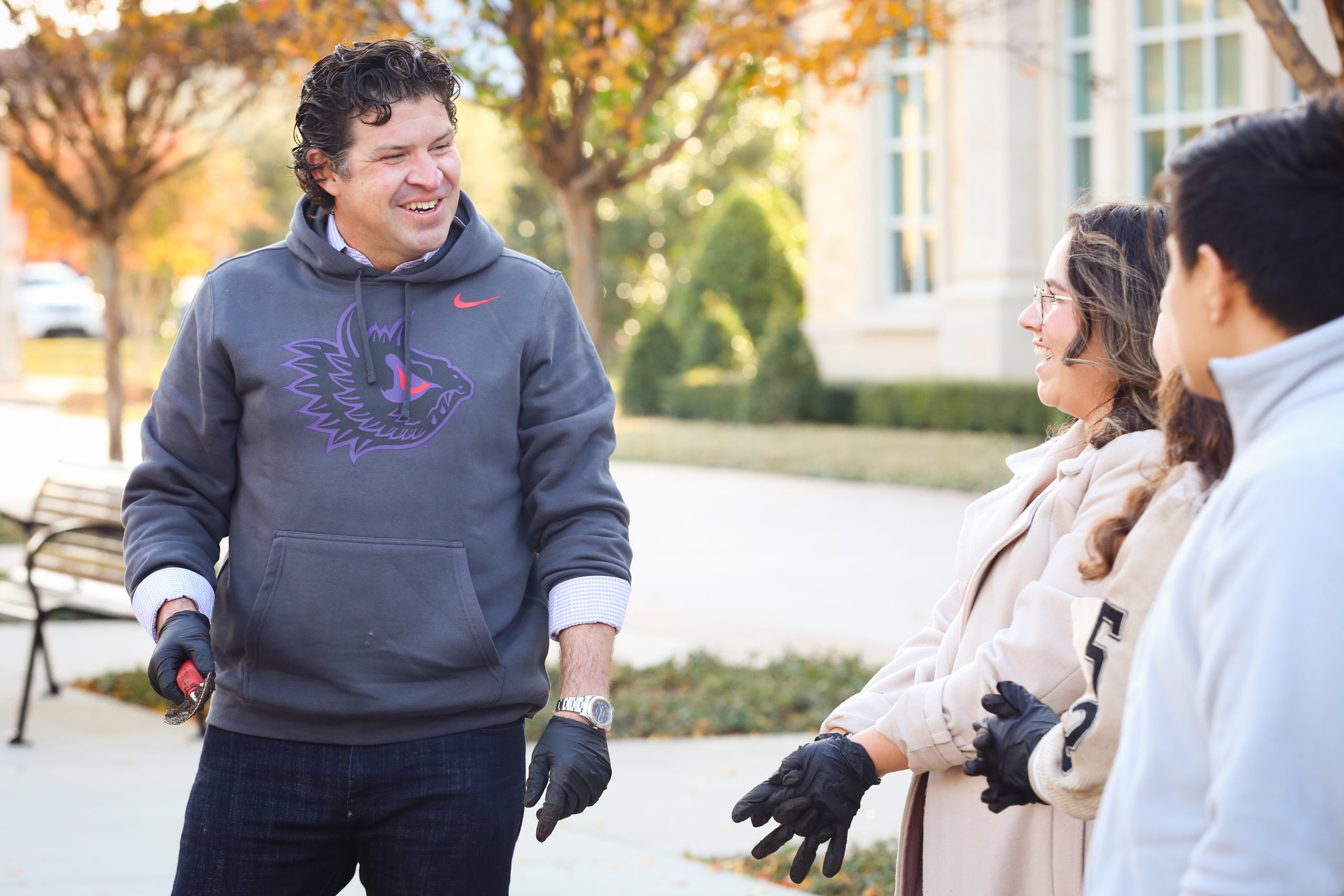
Daniel Pullin pitches in to help members of the TCU community with the annual planting of tulip bulbs outside of The Harrison. Photo by Amy Peterson
He intended to make a brief stop at the University of Oklahoma, his alma mater, to run its Center for the Creation of Economic Wealth before returning to the business world. “But I fell in love with the classroom,” he said. “I could see direct impact every day in how I was investing my time and energy.”
Merianne Kimmel Roth, vice chancellor for marketing & communication, has enjoyed a front-row seat to Pullin’s evangelism about education. “I have heard him speak at length about human potential,” she said. “He consistently gravitates to teaching because he gets truly excited about being with students. He’s deeply inspired by who they’re becoming, what they’re learning and the unique perspectives they bring into that environment — it’s a constant source of energy for him.”
Vision & Strategy
Pullin’s ascent to TCU’s top role was a confident journey. Over six years in Fort Worth, he went from dean of Neeley to president to chancellor. “I learned how to be a Horned Frog,” he said, “and to really tap into the passion and pride and aspiration of our students, faculty, staff and alumni.”
His tenure has coincided with a period of explosive progression and national recognition for the university. Since he arrived, TCU has competed in the College Football Playoff national championship game, completed a successful $1 billion fundraising campaign, opened a cutting-edge medical school and unveiled a strategic plan aimed at elevating both the student population — to nearly 18,000 — and the university’s prestige as a research institution by achieving the highest designation, the Carnegie R1.
His 2023 appointment as TCU president meant moving to The Harrison building to work alongside now-chancellor emeritus Boschini. This began an intensive, 29-month dual-leadership chapter that effectively positioned Pullin as the university’s chief operating officer.
He said the phase led him to “become a student again.” He immersed himself in the machinery of a university operation that thrums in pursuit of the nation’s optimal college experience and student outcomes.
“A university is an academic enterprise,” he said, “but it’s also a community that never closes. We have an active research agenda, an endowment that supports student access, a rapidly evolving college athletics franchise and a health care infrastructure with a school of medicine, a nursing school and other critical clinical professions. We’re a small city inside of Fort Worth, offering resources; creating economic benefit; importing talent; operating utilities, housing and a police force; hosting destination events; and more.”
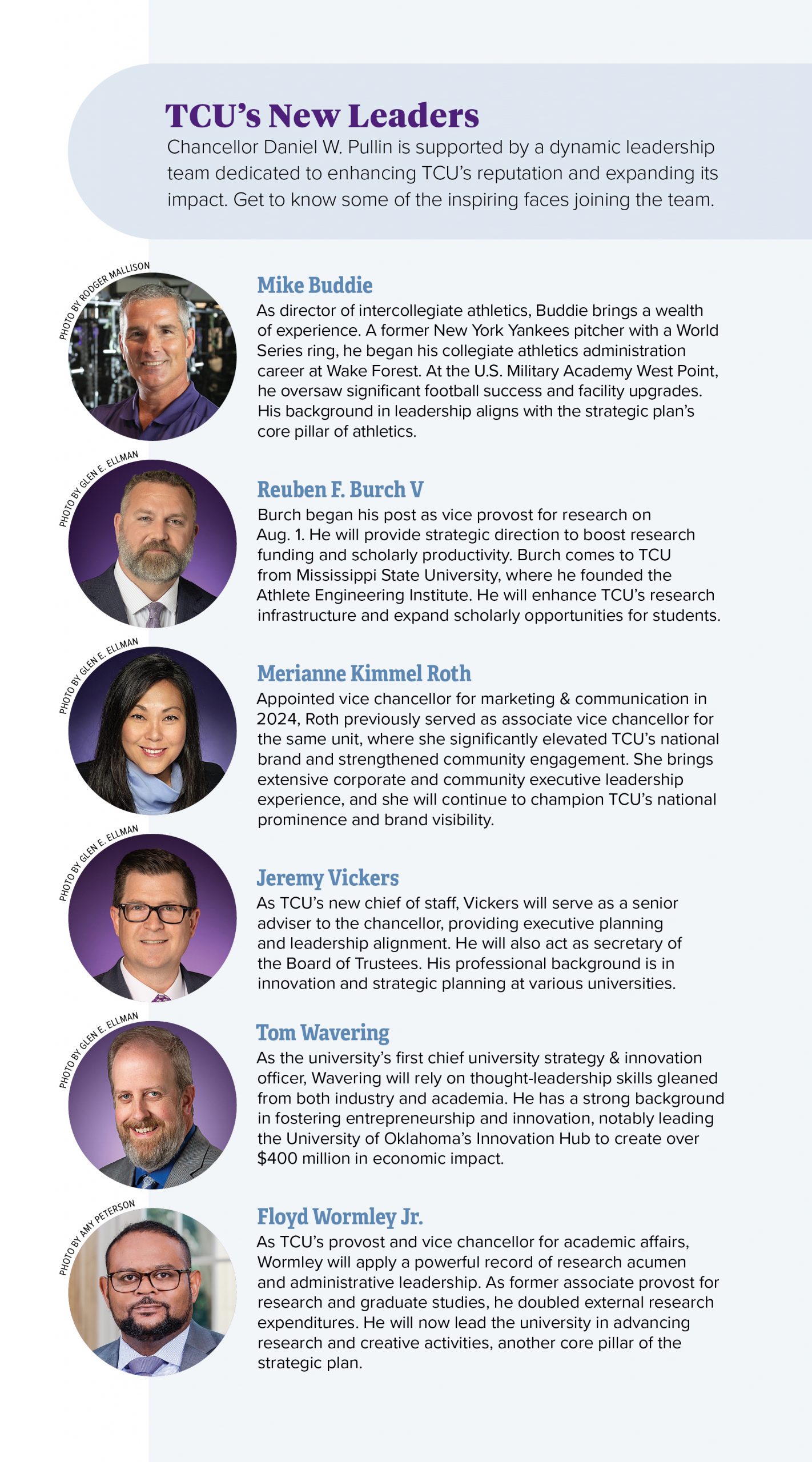
Research, Community and the Human Element
As president, Pullin spearheaded the collaborative process for Lead On: Values in Action, the strategic plan guiding TCU through the next decade. This blueprint drew input from 10,000 TCU community members.
“He’s good at getting people engaged and giving them the ownership,” said Rodney D’Souza, executive director of TCU’s Institute for Entrepreneurship and Innovation, who collaborated with Pullin on TCU’s innovative name, image and likeness training program for student-athletes. “It’s not just him, but everybody involved.”
Still, “the strategic plan personifies Daniel,” said James Hill ’05 MBA, whom Pullin recruited to become director of the TCU Center for Real Estate. “He’s real, and he’s empowering.”
During the ideation process, Pullin was teaching students in his Special Problems in Entrepreneurship & Innovation course how to create a model for organizational evolution. “He shared the strategic plan with us in depth. We were able to see the future of the university in the framework of a business plan,” said Alexandra Holder, a senior accounting and finance major from Little Rock, Arkansas. “It was inspiring to see his enthusiasm for the future paired with a solid plan to achieve those dreams.”
The plan identifies four core pillars: student-centered growth; research, scholarship and creative activities; athletics; and community engagement.
Scaling up TCU’s size and impact carries risk, but Pullin and his leadership team, which includes Cavins-Tull and Roth as well as new Provost Floyd Wormley Jr. and new Director of Intercollegiate Athletics Mike Buddie, are confident.
“I think we are in a time of really bold change within our industry,” Roth said. “And we have to meet it with bold aspiration.”
By adhering to the heritage-rich Horned Frog values of integrity, engagement, community and excellence — what Cavins-Tull calls the “spine of TCU” — the university’s core will remain true.
A hallmark of the TCU educational experience is the teacher-scholar model, a commitment to deep faculty engagement with undergraduates while devoting time to research. Class sizes will remain intentionally small as the undergraduate population grows 50 percent and the graduate students double, and faculty members will still dedicate themselves both to inspiring in the classroom and discovering new knowledge.
The model’s benefits extend both ways, Pullin said. As faculty, “You get to use your talent and training to think about what’s next, or what might be or how can we do something better, but then you can take those insights and bring them into the classroom, into the performance halls, into the laboratories and share those with the next generation of leaders in the form of our students, and then ultimately graduates who can deploy and improve upon those insights in practice.”
This imperative to empower the future is drawing the chancellor back to the classroom, even amid the intense demands of his new role. This fall, he’ll teach another entrepreneurship course, now a core requirement for all business majors.
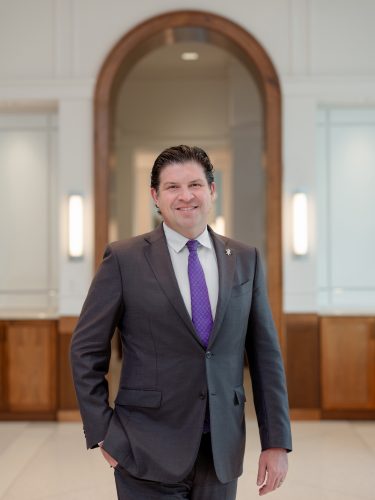
Daniel Pullin began his chancellorship June 1, inheriting not just a title, but a trajectory. Photo by Sara Donaldson
In the classroom, “he’s pretty energetic, and he really likes to engage with the students,” said Eli Garcia ’20 (MBA ’24), who served as Pullin’s teaching assistant. “He likes to create an environment for discussion. … Whether he’s in the classroom or giving a speech directed to his cabinet, I think he likes to hear from everybody.”
That engagement extends to faculty conducting research, which, Pullin said, “is about generating new ideas that ultimately benefit humanity.”
Students at TCU enjoy the distinct advantage of hands-on participation in the research process. Beyond practical skills such as data collection and analysis, research allows students to communicate the integrity and importance of the discovery process, he said, “with the hope of being persuasive enough to encourage people to think differently or act differently.”
Word has spread about the opportunities a TCU education presents. Annual applications have surpassed 20,000 “for a long time,” Cavins-Tull said, “and we’ve only been able to seat about 2,600 or 2,700 students. This is an opportunity now to say we can do more.”
The university will welcome its largest class of incoming students in August.
A Holistic Leader
Pullin and his family are fixtures at TCU sporting and cultural events. The university’s social media accounts recently shared a photo of Pullin and his wife, Ann Bluntzer Pullin, who holds a PhD in organizational management and education administration, serves as executive director of the Hamm Institute for American Energy at Oklahoma State University and is a global expert in the oil and gas industry, enjoying country music legend Robert Earl Keen’s TCU Night Out at Billy Bob’s Texas.
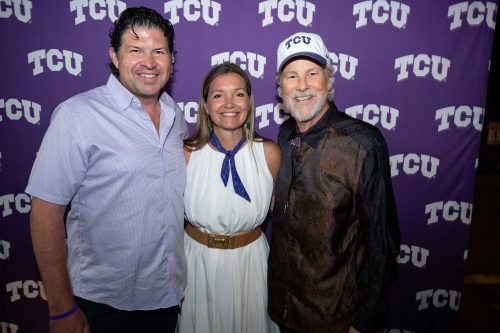
Daniel and Ann Bluntzer Pullin celebrate the beginning of his tenure as TCU chancellor with country music legend Robert Earl Keen. Photo by Glen E. Ellman
“The fine arts are the soul of the university,” Pullin said. “I think the fine arts make all of us just a little bit better of a human. And when we come together for a performance or a reading … it reminds us that we can come together on other things too.”
Today’s opportunity, he believes, is an outgrowth of a shared history, both at TCU and beyond. The university was built from the ashes of the Civil War, a time when Texas and the nation needed to bridge division. University founders Addison and Randolph Clark understood that the path forward depended on a high-quality education — one that built character and knowledge while inspiring students to discover new ways to lead, collaborate and shape the future.
The business leaders Pullin engages with in the 21st century validate this vision, sharing why they covet TCU graduates. Their feedback suggests that the university is delivering on the promised value of education, he said.
“They’re looking for a workforce that’s curious, that’s willing to work with the latest tools and technologies to get the best data, to drive decision-making, to work with people with different experiences and skill sets as a team, to open strong lines of communication, to get to the best, risk-adjusted answer for their organization and then to have the courage and confidence to take action.”
This is precisely the type of leadership TCU’s 11th chancellor intends to model, positioning the university not just to meet the moment, but to define it.

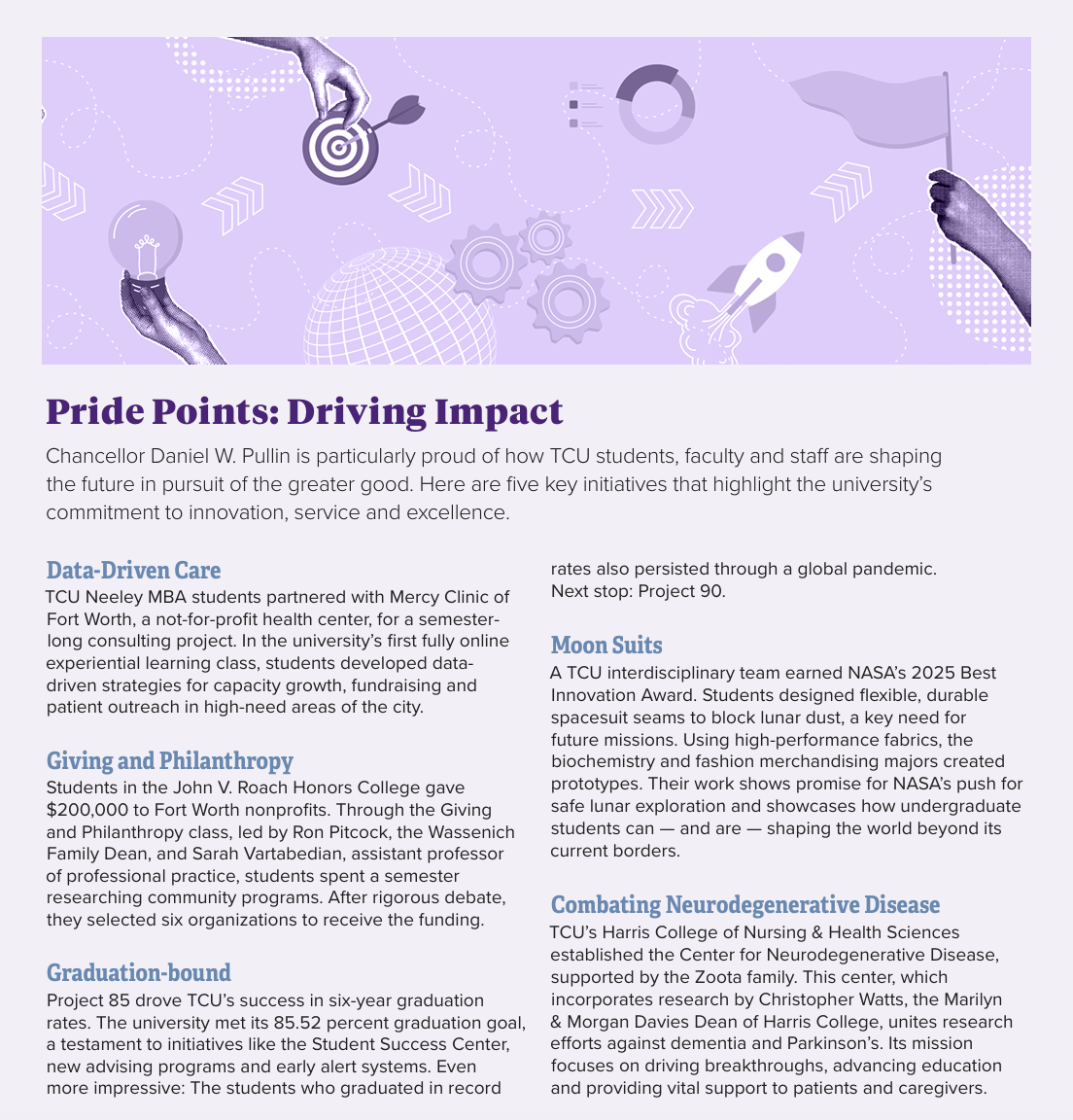
Your comments are welcome
Comments
Related reading:
Features
A Leader Among Leaders
Victor J. Boschini, Jr.’s two-plus decades as Chancellor have transformed a university and a community.
Features
Campus of the Future
TCU’s Campus Master Plan builds on the university’s vision and values.
Campus News: Alma Matters
Daniel Pullin Named TCU President
A national search determined that the perfect candidate was already on campus.